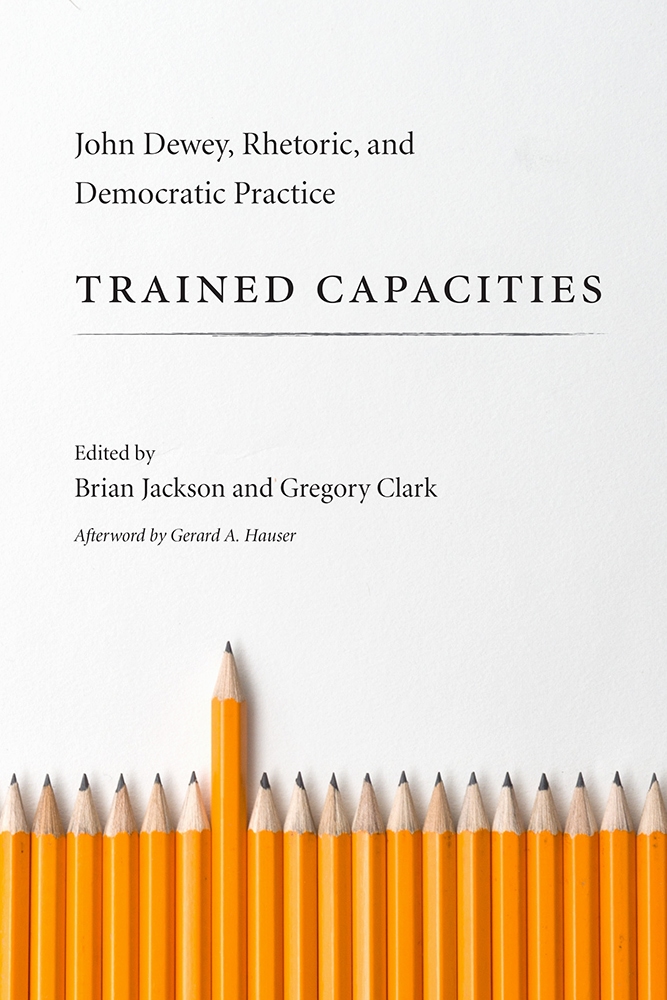A collection examining Dewey's influence on effective communication in a healthy democratic practice
The essays in this collection, written by sixteen scholars in rhetoric and communications studies, demonstrate American philosopher John Dewey's wide-ranging influence on rhetoric in an intellectual tradition that addresses the national culture's fundamental conflicts between self and society, freedom and responsibility, and individual advancement and the common good. Editors Brian Jackson and Gregory Clark propose that this influence is at work both in theoretical foundations, such as science, pragmatism, and religion, and in Dewey's debates with other public intellectuals, such as Jane Addams, Walter Lippmann, James Baldwin, and W. E. B. Du Bois.
Jackson and Clark seek to establish Dewey as an essential source for those engaged in teaching others how to compose timely, appropriate, useful, and eloquent responses to the diverse and often-contentious rhetorical situations that develop in a democratic culture. They contend that there is more at stake than instruction in traditional modes of public discourse because democratic culture encompasses a variety of situations, private or public, civic or professional, where people must cooperate in the work of advancing a common project. What prepares people to intervene constructively in such situations is instruction in those rhetorical practices of democratic interaction that is implicit throughout Dewey's work.
Dewey's writing provides a rich framework on which a distinctly American tradition of a democratic rhetorical practice can be built—a tradition that combines the most useful concepts of classical rhetoric with those of modern progressive civic engagement. Jackson and Clark believe Dewey's practice takes rhetoric beyond the traditional emphasis on political democracy to provide connections to rich veins of American thought such as individualism, liberalism, progressive education, collectivism, pragmatism, and postindustrial science and communication. They frame Dewey's voluminous work as constituting a modern expression of continuing education for the "trained capacities" required to participate in democratic culture. For Dewey human potential is best realized in the free flow of artful communication among the individuals who together constitute society.
The book concludes with an afterword by Gerard A. Hauser, College Professor of Distinction in the Department of Communication at the University of Colorado Boulder.
Brian Jackson is an associate professor of English and university writing coordinator at Brigham Young University. He has published articles in Rhetoric Review, Composition Studies, College Composition and Communication, and other publications.
Gregory Clark is professor of English and associate dean of the College of Humanities at Brigham Young University. He is the author of Rhetorical Landscapes in America: Variations on a Theme from Kenneth Burke (University of South Carolina Press).
"Trained Capacities could not be more timely. The excellent introduction and wide-ranging essays make a major contribution to the renewed interest in John Dewey's rhetorical pragmatism. But perhaps even more importantly this volume as a whole proposes a Dewey-inspired argument aimed at healing today's rhetorically-broken sphere of democratic deliberation"—Steven Mailloux, President's Professor of Rhetoric, Loyola Marymount University
"Trained Capacities could not be more timely. The excellent introduction and wide-ranging essays make a major contribution to the renewed interest in John Dewey's rhetorical pragmatism. But perhaps even more importantly this volume as a whole proposes a Dewey-inspired argument aimed at healing today's rhetorically-broken sphere of democratic deliberation."—Steven Mailloux, President's Professor of Rhetoric, Loyola Marymount University
